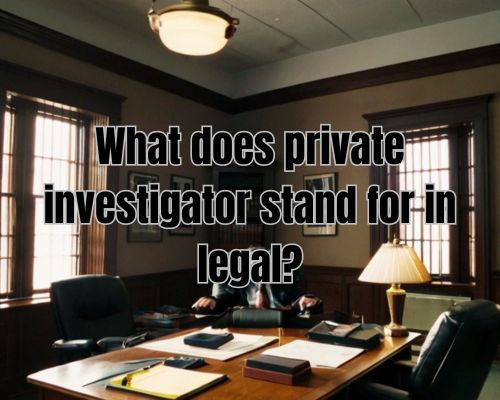
What Does Private Investigator Stand For in Legal Context?
What Does Private Investigator Stand For in Legal Context?
A private investigator, often known as a PI, plays a crucial role in the legal world.
Private investigators like Charles Jimerson from Private Investigator West Palm Beach gather evidence, conduct surveillance, and assist in legal matters.

Their expertise helps solve complex cases, ranging from fraud investigations to personal disputes.
When involved in legal proceedings, private investigators ensure that all gathered information complies with legal standards.
This can include interviewing witnesses, tracking down elusive individuals, and uncovering hidden assets.
Their work must align with legal guidelines to ensure the evidence they collect is admissible in court and holds up under scrutiny.
You might encounter PIs working quietly behind the scenes in various legal contexts.
From supporting criminal defense cases to navigating contentious civil disputes, their skills in meticulous investigation and adherence to the law make them invaluable assets in the legal profession.
Role and Responsibilities of Private Investigators
Private investigators offer a range of services that can significantly impact legal, financial, and personal matters.
They are bound by legal and ethical standards and utilize various investigative techniques and technologies to gather evidence.
Let us get to understand more on these with Charles Jimerson from Private Investigator West Palm Beach.
Legal Boundaries and Ethical Standards
Private investigators must adhere to strict legal boundaries to protect individual rights and maintain the integrity of their work.
Trespassing and unauthorized recording are illegal and can lead to severe consequences.
You must ensure you have proper consent and comply with privacy laws.
Ethical considerations also play a significant role.
Maintaining client confidentiality and avoiding conflicts of interest are essential.
Ethical guidelines ensure that investigations are conducted lawfully and that gathered evidence is admissible in court.
Investigative Techniques and Technology
Effective private investigations rely on a mix of traditional and modern techniques.
Surveillance is a primary method, involving discreet observation and documentation, often through photographs or videos.
Technological advancements have enhanced these capabilities.
GPS tracking and social media monitoring allow for more comprehensive investigations.
Background checks and database searches can quickly yield critical information.
You also conduct interviews and interrogations to gather firsthand accounts.
Utilizing these tools effectively helps you compile credible evidence that can support legal actions or provide clarity in personal matters.
Operational Limitations and Legal Compliance
Private investigators (PIs) face specific operational limitations outlined by legal and ethical guidelines.
These limitations not only ensure the protection of individuals’ privacy but also define the permissible scope of their investigative actions.
Laws Governing Surveillance and Privacy
Private investigators must adhere strictly to privacy laws when conducting surveillance.
Surveillance on public property is permissible, but observing individuals on private property without consent is typically illegal.
Federal law imposes restrictions on activities such as wiretapping and hacking. Meanwhile, states may have additional regulations, requiring PIs to be familiar with local laws.
For example, many states operate under “two-party consent” laws, making unauthorized recording of private conversations illegal.
This compliance helps avoid severe legal consequences like fines or imprisonment, ensuring that evidence gathered can be admissible in court cases.
Gathering and Utilization of Information
Private investigators have specific methods for gathering information legally. They often rely on public records. They also conduct background checks and discreetly interview people.
Utilizing hacking or impersonating others to access financial records, phone records, or private information is strictly prohibited.
A licensed private investigator must maintain integrity when collecting and using data. Misrepresentation or false pretenses can lead to legal actions against both the investigator and their clients.
Responsibility includes ensuring that reports and evidence prepared for court proceedings are ethically sourced and verifiable. This provides a strong foundation for legal cases.